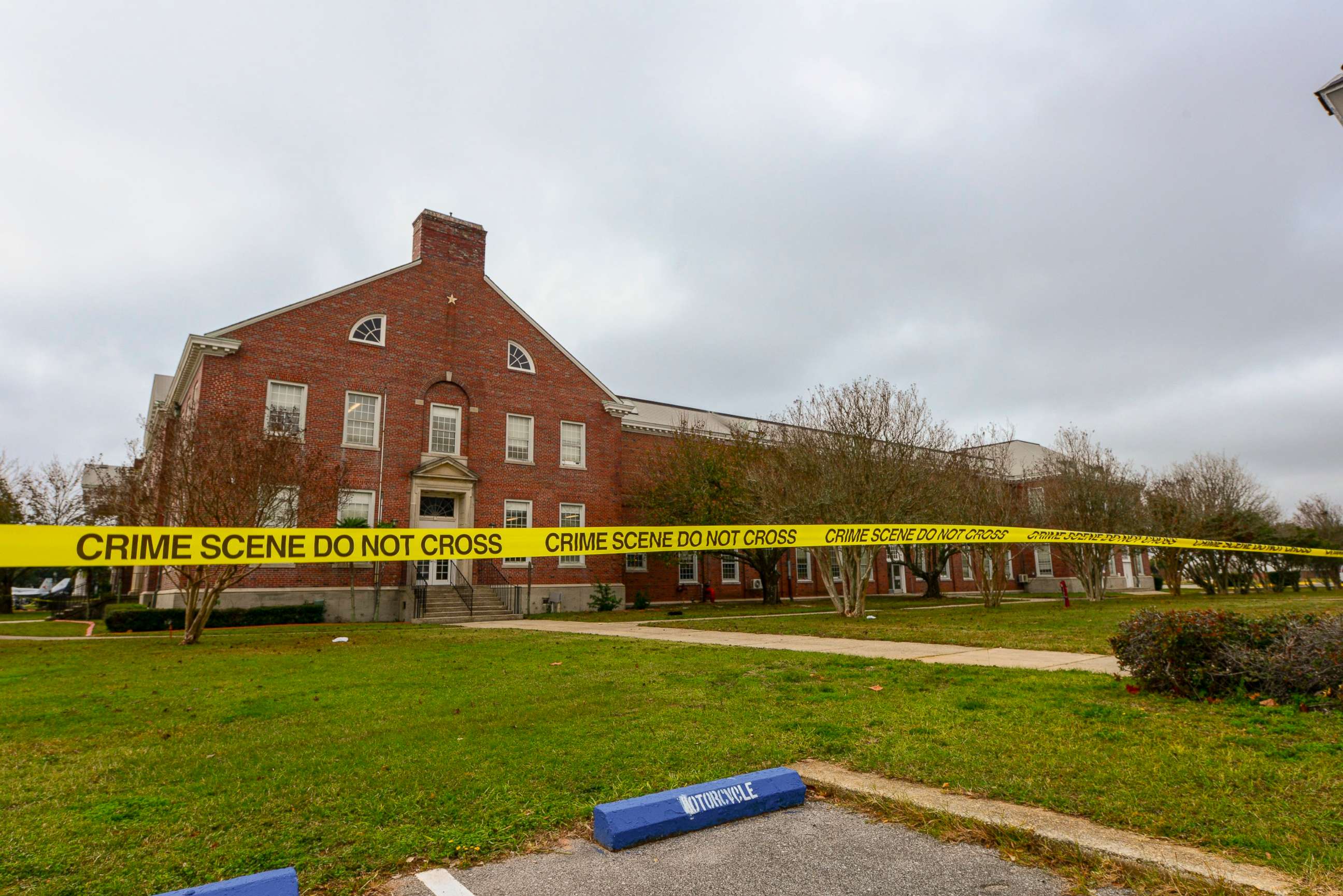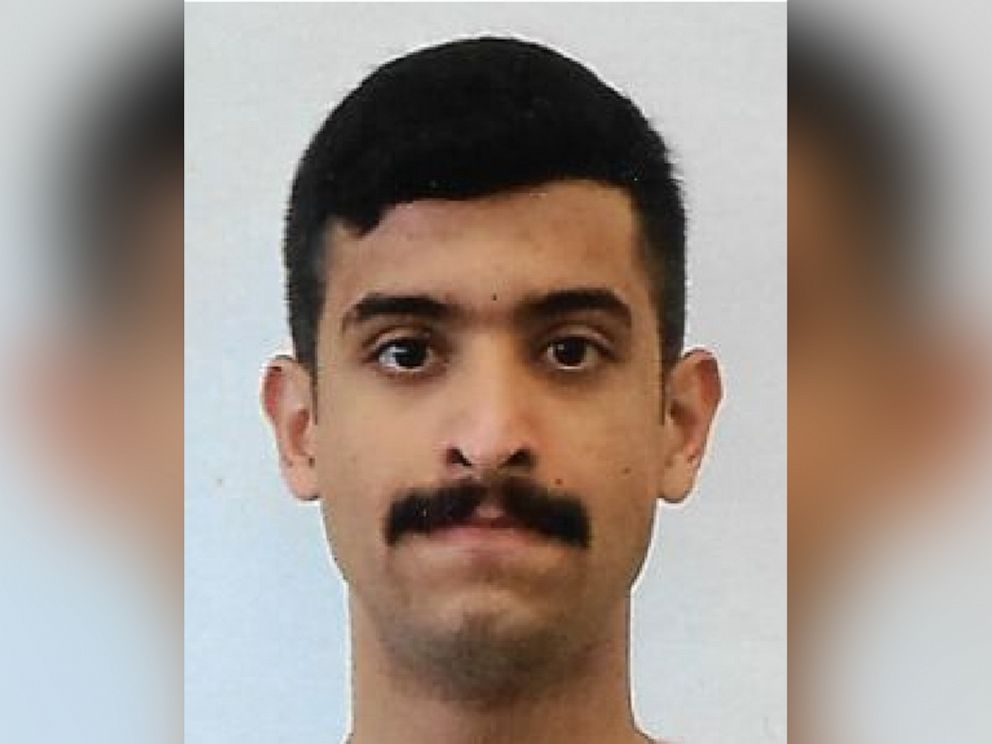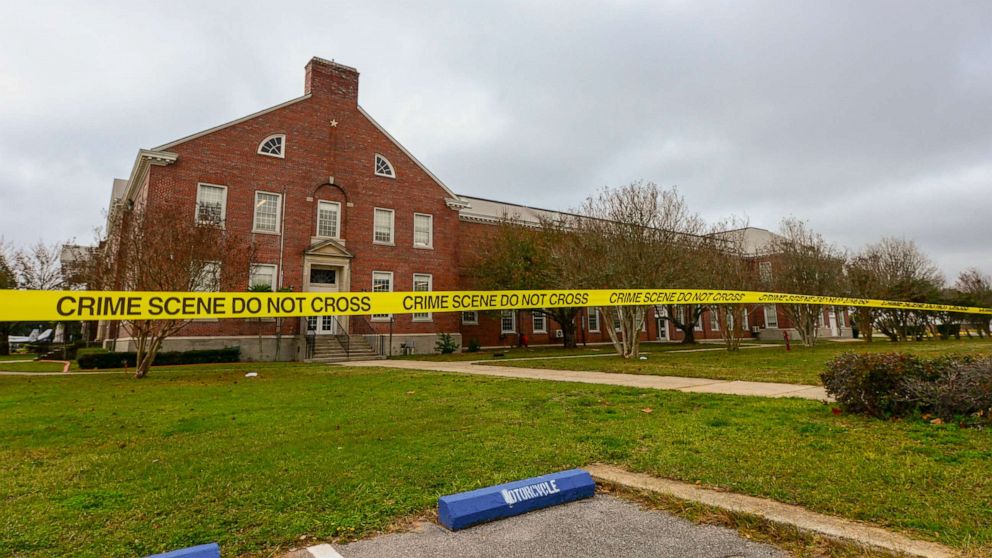Attorney General Barr announces expulsion of 21 Saudi trainees following probe of Pensacola shooter
Twenty-one Saudi students will be expelled from the U.S. following an investigation into the Saudi military officer who killed three sailors and wounded eight others at the Naval Air Station in Pensacola last month, Attorney General William Barr announced Monday.
In a news conference at the Justice Department, Barr said an investigation of the shooter Lt. Mohammed Alshamrani has determined he was "motivated by jihadist ideology," and called the attack an "act of terrorism."
While the 21 trainees identified by investigators were not found to have aided Alshamrani in the attack, a review launched by the FBI found that several of the students had possessed "derogatory material" on their computers or personal devices.
"17 had social media containing some jihadi or anti-American content," Barr said. "However, there was no evidence of any affiliation or involvement with any terrorist activity or group. 15 individuals (including some of the 17 just mentioned) had had some kind of contact with child pornography."
Twelve of the 21 students identified were trainees at the Pensacola Naval Air Station, officials said, while the other nine were receiving their training in military facilities across the U.S.
While U.S. attorneys determined that the flagged material did not warrant prosecution inside the U.S., Barr said, the Saudi armed forces had determined the cases "demonstrated conduct unbecoming an officer," and the students were subsequently dis-enrolled from service.
Officials said they expected the 21 would face "harsh punishment" upon their return to the Kingdom, and that the U.S. has received a commitment from the Saudis that if any are implicated in the still-ongoing counterterrorism probe of the shooting, they would be extradited back to the U.S. to face prosecution.
Barr and FBI Deputy Director Bowdich also raised criticism of Apple for what they described as a lack of cooperation with investigators' requests to help access two iPhones that Alshamrani sought to destroy during the shooting.
While FBI technicians have been able to repair the phones, according to Barr, they have not been able to bypass the security functions on the phones to get full access to them.
"So far Apple has not given us any substantive assistance," Barr said. "This situation perfectly illustrates why it is critical that investigators be able to get access to digital evidence once they have obtained a court order based on probable cause."
In a statement released Monday night, the company said it rejects "the characterization that Apple has not provided substantive assistance in the Pensacola investigation. Our responses to their many requests since the attack have been timely, thorough and are ongoing."
"Within hours of the FBI’s first request on December 6th, we produced a wide variety of information associated with the investigation. From December 7th through the 14th, we received six additional legal requests and in response provided information including iCloud backups, account information and transactional data for multiple accounts," the company said.
Apple says the FBI notified the company on Jan. 6, that the agency needed additional assistance in the investigation and it was only on Jan. 8, that the company received a subpoena.
On Tuesday, a Department of Justice spokesperson blasted Apple.
“A federal judge has authorized the Department of Justice to access the contents of the dead terrorist’s phones. Apple designed these phones and implemented their encryption. It’s a simple, “front-door” request: will Apple help us get into the shooter’s phones or not," DOJ spokesperson Kerri Kupec said in a statement to ABC News.
A senior DOJ official said Apple hasn't answered whether it would even have the capability to unlock the phones, reviving a privacy debate that last rose to national attention when the FBI battled with Apple over gaining access to phones owned by the perpetrators of the San Bernardino terror attack in 2015.
"We have always maintained there is no such thing as a backdoor just for the good guys. Backdoors can also be exploited by those who threaten our national security and the data security of our customers," Apple continued to say in a statement. Adding they will continue to work with the FBI in the investigation and expressed "great respect" for law enforcement.
In the news conference, Barr provided further information into what investigators uncovered about Alshamrani's background that tied him directly to jihadist causes.
The FBI found that Alshamrani had posted a message on social media on Sep. 11 this year, saying, "the countdown has begun." Investigators also learned that he visited the 9/11 Memorial in New York City over Thanksgiving weekend, and posted anti-American messages as recently as two hours before carrying out the attack at the base.
Bowdich said the FBI interviewed "more than 500 people," and they "continue to run down many new leads." The shooting itself lasted 15 minutes, Bowdich said, he was engaged by law enforcement about 8 minutes in. He was killed by responding law enforcement and found to have possessed 180 rounds of ammunition.
The FBI also determined the suspect had studied Al Qaeda’s U.S.-born cleric Anwar al-Awlaki, whose propaganda campaign may have inspired more radicals than anyone outside of Osama Bin Laden before he was killed in a U.S. drone strike in 2011.
Barr told ABC News' Pierre Thomas said the investigation showed that the vetting of candidates who are brought from foreign countries "should be improved," but declined to speculate whether such improvements would have thwarted Alshamrani's attack.
Following the Pensacola shooting, the Pentagon announced a ban on operational training for 852 Saudi students on U.S. bases, though classroom instruction for the students continued after a DOD "screening" of all Saudi military students training at U.S. bases found "no information indicating an imminent threat."
However, a senior defense official at the time cautioned that it was a screening tool, not an investigative tool, and so it was not possible to draw wider conclusions about what Saudi students may have known about the Dec. 6 attack. There are a total of 272 international military students at Pensacola from a number of countries.

"I have signed out directives that address enhanced screening of all of our foreign students, that address credentialing going forward, weapons policies, et cetera," Defense Secretary Mark Esper said in an interview with CBS' "Face The Nation" on Sunday when asked about the planned expulsions.
"I think we're being very careful," National Security Adviser Robert O'Brien said Sunday in an appearance on "Fox News Sunday." "Obviously Pensacola showed that there had been errors in the way that we vetted, and I think out of an abundance of caution Secretary Esper's taking these actions to protect our service men and women."
Former acting undersecretary for intelligence at the Department of Homeland Security John Cohen said the circumstances surrounding the shooting reflect the broader challenges faced by the Pentagon in vetting foreign military personnel who attend training inside the U.S.
“Foreign military personnel need to be vetted not only as they are traveling to the U.S. but also on a recurrent basis throughout their stay," Cohen, an ABC News contributor, said Monday. "Vetting procedures also need to be updated regularly so that they take into account an evolving threat environment.”

A joint intelligence bulletin released shortly after the shooting showed that the shooter wrote the phrase “the countdown has started,” on Sept. 11, 2019, and that Alshamrani referred to non-Muslims as “infidels” and defended jihad.
"I'm against evil, and America as a whole has turned into a nation of evil," one post read, according to the report. "What I see from America is the supporting of Israel which is invasion of Muslim countries, I see invasion of many countries by its troops, I see Guantanamo Bay. I see cruise missiles, cluster bombs and UAV."
The bulletin also offered more details about the shooting, saying that the shooter purchased the gun through a hunting exemption for foreign nationals and detailed that the shooter fired shots directly at photos of President Trump and another unnamed president.




